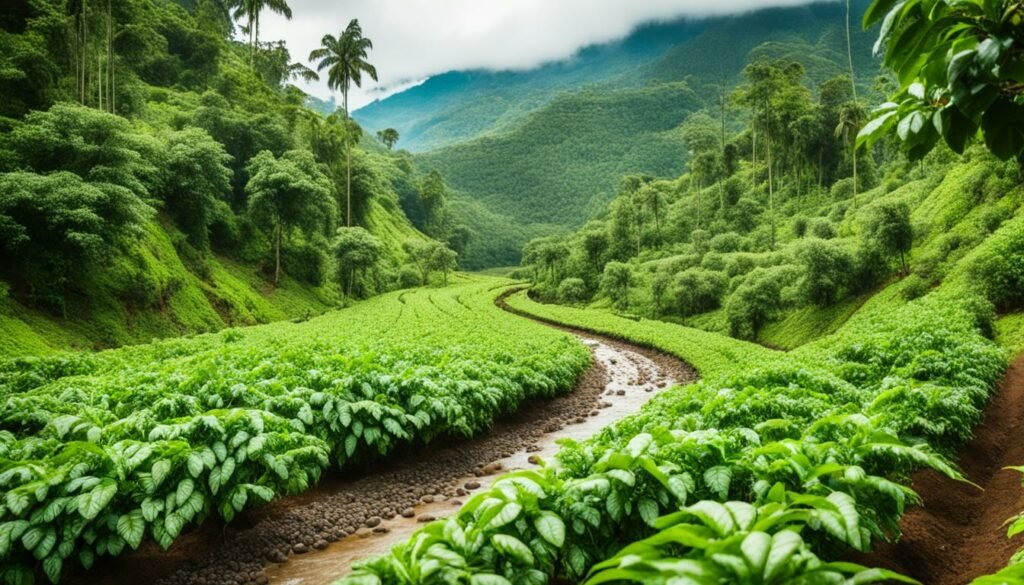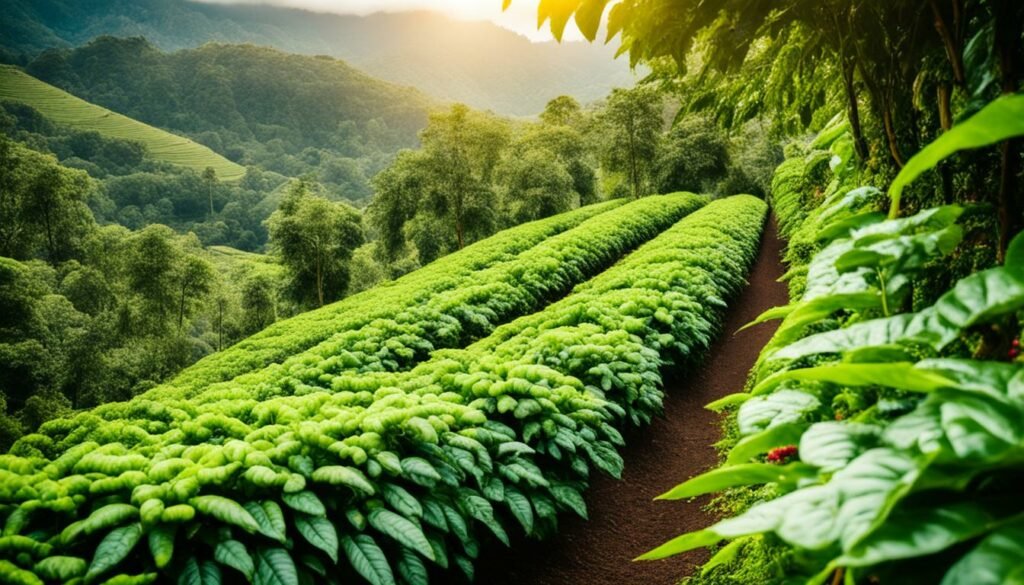I recall the day I discovered a quaint coffee shop in Portland. The air was filled with the enticing aroma of organic coffee, drawing me in. As I savored my first sip, the barista enlightened me about the environmental advantages of organic coffee. This conversation sparked my interest, leading me to delve into sustainable coffee farming practices.
Since then, I’ve come to understand how organic coffee farming reduces pesticide use and supports environmental conservation. The more I learned, the clearer it became that my daily coffee habit could influence the planet’s health. This realization motivated me to explore organic coffee further, uncovering its significant environmental benefits.
Understanding Organic Coffee Production
I’ve always been intrigued by the coffee journey from farm to cup. Organic coffee production exemplifies sustainable agriculture in action. Let’s delve into the evolution of coffee farming and the standards for organic practices.
Traditional Shade-Grown Methods
Coffee once thrived under the forest canopy. Farmers intercropped coffee with other plants, fostering a diverse ecosystem. This method supported wildlife and employed natural pest control. It showcases organic farming practices in harmony with nature.
The Shift to “Technified Agriculture”
The 1970s and 1980s marked a significant change in coffee production. Farms cleared forests for more coffee plants and began using chemicals to increase yields. This shift had severe consequences:
- Loss of biodiversity
- Increased soil erosion
- Water pollution from chemical runoff
USDA Organic Certification Standards
The 1990s brought a shift back to sustainability with the USDA organic certification. These standards prohibit the use of synthetic pesticides or fertilizers. To qualify, farms must adhere to rigorous guidelines:
| Requirement | Description |
|---|---|
| Soil Management | Use of natural compost and crop rotation |
| Pest Control | Biological methods and natural predators |
| Weed Control | Manual removal or natural mulches |
| Buffer Zones | Separation from non-organic crops |
USDA organic certification has become a benchmark in coffee production. It ensures every step, from planting to processing, adheres to organic principles. By choosing certified organic coffee, I support quality and sustainability.
Environmental Benefits of Organic Coffee
Organic coffee farming presents numerous environmental benefits. This approach significantly impacts our planet positively. Let’s examine the key areas where organic coffee cultivation excels.
Reduced Pesticide and Chemical Use
Organic coffee farming significantly cuts down on synthetic pesticides and chemicals. This reduction safeguards ecosystems and human health. Organic coffee cultivation promotes sustainability and provides a safer choice for consumers and farmers.

Soil Conservation and Biodiversity
Soil conservation is vital in organic coffee farming. Techniques like composting and crop rotation enrich soil health and structure. These methods not only elevate coffee quality but also aid in biodiversity preservation. The diverse shade trees in these farms create habitats for various species, enriching the ecosystem.
Water Conservation and Protection
Water conservation is a key advantage of organic coffee production. Sustainable farming lowers pollution and preserves water quality. By eschewing synthetic chemicals, these farms safeguard water sources from contamination. This effort benefits the local environment and enhances global water health.
| Environmental Aspect | Conventional Coffee | Organic Coffee |
|---|---|---|
| Pesticide Use | High | Minimal to None |
| Soil Health | Degraded over time | Improved through natural methods |
| Biodiversity | Limited | Thriving |
| Water Quality | At risk of contamination | Protected and preserved |
Organic coffee’s environmental benefits make it a top choice for eco-aware consumers. Supporting organic farms aids in soil, biodiversity, and water conservation. It’s a straightforward yet potent way to positively impact our planet while savoring a delightful coffee. Organic coffee also boasts health advantages, benefiting both our bodies and the environment.
Sustainable Farming Practices in Organic Coffee Production
Organic coffee farming transcends mere chemical avoidance. It’s a comprehensive approach that enriches the environment and supports communities. Let’s delve into the essential practices that underscore organic coffee production’s sustainability.

Organic farming champions biodiversity and soil vitality. It employs natural pest control strategies, such as neem oil, to deter pests without endangering beneficial species. Additionally, composting coffee pulp is a smart move. It transforms waste into a fertilizer rich in nutrients, thereby diminishing the reliance on synthetic additives.
Protecting the rainforest is integral to sustainable coffee cultivation. Many organic farms safeguard native trees, establishing a canopy that shelters wildlife and minimizes carbon emissions. This shade-grown technique replicates the coffee plant’s natural habitat, yielding beans that ripen more slowly and boast a richer flavor profile.
Water conservation is paramount. Organic farmers often deploy efficient irrigation systems and employ minimal water in coffee processing. This not only conserves a vital resource but also prevents water pollution.
Often, fair trade certification complements organic farming. It guarantees farmers equitable remuneration and ensures they work in secure conditions. This commitment to social sustainability is equally vital as the environmental efforts.
| Sustainable Practice | Environmental Benefit | Social Benefit |
|---|---|---|
| Natural pest control | Preserves beneficial insects | Safer for farm workers |
| Composting | Improves soil health | Reduces waste |
| Shade-grown methods | Protects biodiversity | Produces higher quality coffee |
| Water conservation | Preserves local water sources | Ensures clean water for communities |
| Fair trade practices | Encourages sustainable farming | Improves farmers’ livelihoods |
Through these practices, organic coffee farmers do more than produce exceptional coffee. They’re cultivating a sustainable future for the environment and coffee-growing communities alike.
Impact on Wildlife and Ecosystems
Organic coffee farming extends beyond exceptional coffee production. It is crucial for wildlife conservation and ecosystem protection. I’ve witnessed these farms become sanctuaries for a variety of plants and animals.
Preserving Bird Habitats
During my visits to organic coffee farms, the melodies of birds resonate through the air. These farms, particularly those that employ shade-grown techniques, offer ideal habitats for birds. The canopy provides shelter and sustenance. Bird-friendly coffee is instrumental in safeguarding numerous songbird species from the brink of extinction.
Supporting Diverse Flora and Fauna
Organic coffee farms are alive with biodiversity. I’ve observed a plethora of insects, small mammals, and diverse plants. This abundance signifies a robust ecosystem. By opting for organic coffee, we champion these vibrant natural communities.
Mitigating Deforestation
Deforestation poses a significant threat to coffee-growing areas. Organic farming counters this menace. By preserving forests, these farms serve as natural barriers against habitat destruction. I firmly believe that every cup of organic coffee we consume is a move towards safeguarding our planet’s vital forests and the wildlife they harbor.
FAQ
What are the traditional methods of organic coffee farming?
Organic coffee farming began as an understory crop in Africa, nestled under large shade trees. It was integrated with other food crops. This method supported wildlife and employed sustainable farming techniques.
Why is USDA Organic certification important for coffee?
The USDA introduced strict standards for organic farming in the 1990s. To be certified, coffee must adhere to these standards throughout its growth and supply chain. This means it can’t use synthetic fertilizers or pesticides, ensuring a safer product.
How does organic coffee farming reduce environmental impact?
By avoiding synthetic pesticides and chemicals, organic coffee farming protects ecosystems and human health. It uses natural fertilizers and crop rotation to conserve soil. Diverse shade trees and natural habitats support biodiversity. Sustainable farming methods also help conserve water by reducing pollution and maintaining water quality.
What sustainable farming practices are used in organic coffee production?
Organic coffee farmers focus on biodiversity, sustainability, and community. They use natural pest control and composting coffee pulp. Crop rotation and preserving rainforest areas are also key practices. These methods reduce the carbon footprint and ensure fair labor conditions through fair trade certification.
How does organic coffee farming benefit wildlife and ecosystems?
Shade-grown organic coffee farming is vital for wildlife habitats, especially for birds. The tree canopy provides a habitat for various species. This approach supports a diverse ecosystem, aiding in biodiversity conservation. It also helps combat deforestation, a major issue in coffee-growing areas.











